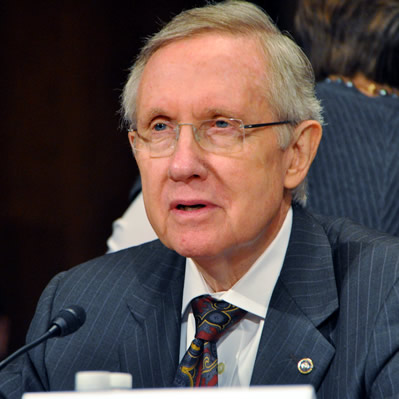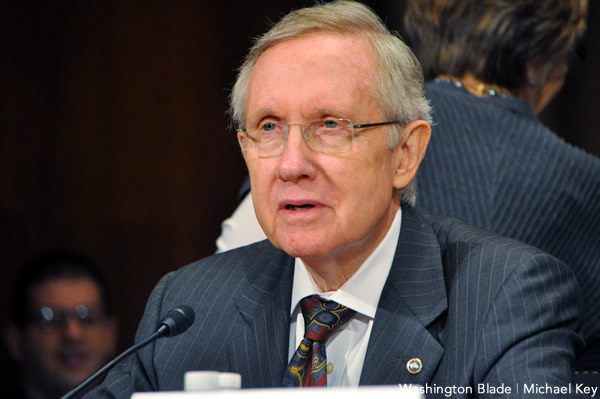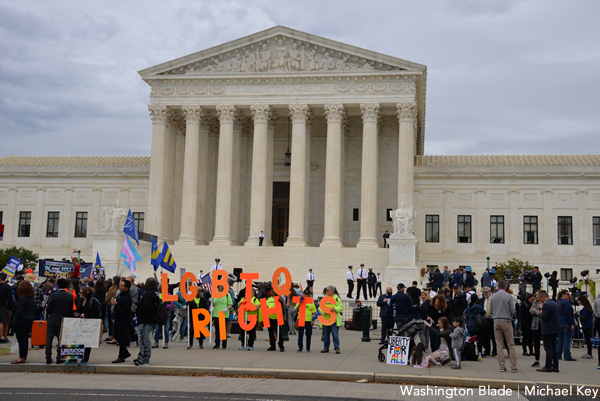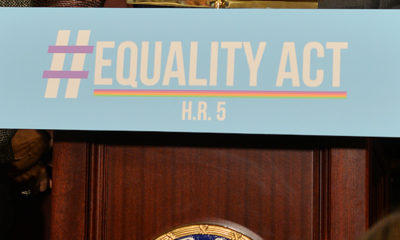News
Reid to set up ENDA vote before Thanksgiving
Bill to stop anti-LGBT job bias to come to Senate floor this work period


Senate Majority Leader Harry Reid (D-Nev.) is set to announce he’ll bring ENDA to floor this Thanksgiving (Blade file photo by Michael Key).
Senate Majority Leader Harry Reid (D-Nev.) announced on the Senate floor Monday that he’ll bring up the Employment Non-Discrimination Act for a vote before Thanksgiving.
In his first remarks following a short recess, Reid said the bill, which would prohibit anti-LGBT bias in the workforce, would be among the items the Senate will take up during the four-week work period.
“We’re going to consider the act known as ENDA,” Reid said, adding that it “failed in the House of Representatives before, but we’re going to take it up here again.”
Adam Jentleson, a Reid spokesperson, said the exact floor timing “remains to be determined based on how votes go this week,” but a vote on the long pursued legislation to prohibit anti-LGBT job bias could come up as early as next week.
Sen. Jeff Merkley (D-Ore.), chief sponsor of ENDA, praised Reid in a statement for the decision to bring ENDA to the floor in the coming weeks.
“I thank Majority Leader Reid for committing to bring ENDA to the floor this work period. Americans understand that it’s time to make sure our LGBT friends and family are treated fairly and have the same opportunities,” Merkley said. “Now it’s time for our laws to catch up. People should be judged at work on their ability to do the job, period.”
The Senate Health, Education, Labor & Pensions Committee reported out ENDA on bipartisan basis in July by a 15-7 vote. Sen. Mark Kirk (R-Ill.), an original co-sponsor of the bill, and Sens. Orrin Hatch (R-Utah) and Lisa Murkowski (R-Alaska) joined all 12 Democratic members of the committee in voting in favor of the legislation.
The legislation is unlikely to proceed to the floor by unanimous consent, so 60 votes will be necessary to end a filibuster. That hurdle is higher than the 54 senators who currently sponsor the bill.
Fred Sainz, vice president of communications for the Human Rights Campaign, expressed gratitude that Reid is poised to bring the bill to floor vote and said 60 votes are within sight.
“We’re gratified that Senator Reid is bringing this important bill to the floor,” Reid said. “Over the course of the past six months, we’ve worked hard to ensure that senators know their constituents support this bill. We’re in the homestretch of securing the 60 votes necessary and remain optimistic that the support will be there when we need it.”
Tico Almeida, president of Freedom to Work, was more bullish and said 60 votes are already present on the floor to pass ENDA.
“We’re ready for a winning vote,” Almeida said. “After months of Republican outreach led by our Legislative Director Christian Berle and teamed with Log Cabin Republicans, we’re confident we have the 60 votes to defeat any attempted filibuster.”
The goal of finding 60 votes to pass ENDA in the Senate is a small hurdle in comparison to finding sufficient support for passing the bill in the House, where Republican control will make passage daunting to say the least.
Mara Keisling, executive director of the National Center for Transgender Equality, expressed gratitude that a Senate vote on ENDA would take place, but suggested that a House vote will have to come at later time when the makeup is different.
“Because of all the work people have done over the years at the grassroots level and on Capitol Hill, we’re optimistic that the Senate vote will go our way,” Keisling said. “The forthcoming Senate vote will change the playing field once we have a friendlier House that can tackle ENDA.”
Advocacy groups have been ramping up their efforts on ENDA in expectations that a Senate vote on the bill would take place sometime this fall. The most prominent among them is Obama’s political arm, Organizing for Action.
Last week, Organizing for Action held a conference call with supporters and Matt McTighe, campaign manager for Americans for Workplace Opportunity, to discuss the legislation. The organization has also sent out to email blasts to supporters asking them to let the senators know that backing ENDA “is about standing up for what’s right.”
Ben Finkenbinder, an OFA spokesperson, said his organization is helping to pass ENDA because it’s about making sure all Americans have equal opportunity in the workplace.
“OFA is working to make sure Americans know what is at stake in the ENDA fight, ensuring all Americans who work hard have a fair shot — which means every American having the same protections in the workplace, no matter who they are or whom they love,” Finkenbinder said.
With the exception of three lawmakers, every Democrat in the Senate is an ENDA co-sponsor. The three holdouts are Sens. Mark Pryor (D-Ark.), Joe Manchin (D-W.V.) and Bill Nelson (D-Fla.). Additional Republicans that Log Cabin has said could support the bill are Sens. Rob Portman (R-Ohio), Kelly Ayotte (R-N.H.), Dean Heller (R-Nev.), Jeff Flake (R-Ariz.) and Pat Toomey (R-Pa.).
According to a Friday report in the Washington Post, Cindy McCain has also engaged in lobbying efforts to encourage her husband Sen. John McCain (R-Ariz.) to back ENDA. She signed a postcard from the Human Rights Campaign urging her husband to support the bill.
The Post reported that HRC organizer John Gomez spotted Cindy McCain at a Staples in Arizona. After talking with her about ENDA, Cindy McCain said she shared her support for the bill, signing the postcard and addressed it to her husband, according to the Post.
Freedom to Work’s Almeida said his organization has been pursuing Latino voters in efforts to encourage senators in Florida, Arizona in Nevada, which have significant Latino populations, to support the legislation.
“Last week we launched phone-banking to thousands of registered Latino voters in Arizona and Nevada asking them to patch-through to Senators McCain, Flake and Heller to urge them to vote ‘yes,'” Almeida said. “We’re using bilingual call centers and the same parameters for Latino voter lists that national Latino organizations used earlier this year to flood the Senate with calls in favor of immigration reform.”
Politics
After Biden signs TikTok ban its CEO vows federal court battle
“Rest assured, we aren’t going anywhere,” CEO said

President Joe Biden signed an appropriations bill into law on Wednesday that provides multi-billion dollar funding and military aid for Ukraine, Israel, and Taiwan after months of delay and Congressional infighting.
A separate bill Biden signed within the aid package contained a bipartisan provision that will ban the popular social media app TikTok from the United States if its Chinese parent company ByteDance does not sell off the American subsidiary.
Reacting, TikTok CEO Shou Zi Chew said Wednesday that the Culver City, Calif.-based company would go to court to try to remain online in the United States.
In a video posted on the company’s social media accounts, Chew denounced the potential ban: “Make no mistake, this is a ban, a ban of TikTok and a ban on you and your voice,” Chew said. “Rest assured, we aren’t going anywhere. We are confident and we will keep fighting for your rights in the courts. The facts and the Constitution are on our side, and we expect to prevail,” he added.
Our response to the TikTok Ban Bill in the US: https://t.co/LpoE67sxHo
— TikTokComms (@TikTokComms) April 24, 2024
White House Press Secretary Karine Jean-Pierre adamantly denied during a press briefing on Wednesday that the bill constitutes a ban, reiterating the administration’s hope that TikTok will be purchased by a third-party buyer and referencing media reports about the many firms that are interested.
Chew has repeatedly testified in both the House and Senate regarding ByteDance’s ability to mine personal data of its 170 million plus American subscribers, maintaining that user data is secure and not shared with either ByteDance nor agencies of the Chinese government. The testimony failed to assuage lawmakers’ doubts.
In an email, the former chair of the House Intelligence Committee, California Democratic Congressman Adam Schiff, who doesn’t support a blanket ban of the app, told the Blade:
“As the former chairman of the House Intelligence Committee, I have long worked to safeguard Americans’ freedoms and security both at home and abroad. The Chinese Communist Party’s ability to exploit private user data and to manipulate public opinion through TikTok present serious national security concerns. For that reason, I believe that divestiture presents the best option to preserve access to the platform, while ameliorating these risks. I do not support a ban on TikTok while there are other less restrictive means available, and this legislation will give the administration the leverage and authority to require divestiture.”
A spokesperson for California U.S. Senator Alex Padilla told the Blade: “Senator Padilla believes we can support speech and creativity while also protecting data privacy and security. TikTok’s relationship to the Chinese Communist Party poses significant data privacy concerns. He will continue working with the Biden-Harris administration and his colleagues in Congress to safeguard Americans’ data privacy and foster continued innovation.”
The law, which gives ByteDance 270 days to divest TikTok’s U.S. assets, expires with a January 19, 2025 deadline for a sale. The date is one day before President Biden’s term is set to expire, although he could extend the deadline by three months if he determines ByteDance is making progress or the transaction faces uncertainty in a federal court.
Former President Donald Trump’s executive order in 2020, which sought to to ban TikTok and Chinese-owned WeChat, a unit of Beijing, China-based Tencent, in the U.S., was blocked by federal courts.
TikTok has previously fought efforts to ban its widely popular app by the State of Montana last year, in a case that saw a U.S. District Court judge in Helena block that state ban, citing free-speech grounds.
The South China Morning Post reported this week that the four-year battle over TikTok is a significant front in a war over the internet and technology between Washington and Beijing. Last week, Apple said China had ordered it to remove Meta Platforms’ WhatsApp and Threads from its App Store in China over Chinese national security concerns.
A spokesperson for the ACLU told the Blade in a statement that “banning or requiring divestiture of TikTok would set an alarming global precedent for excessive government control over social media platforms.”
LGBTQ+ TikToker users are alarmed, fearing that a ban will represent the disruption of networks of support and activism. However, queer social media influencers who operate on multiple platforms expressed some doubts as to long term impact.
Los Angeles Blade contributor Chris Stanley told the Blade:
“It might affect us slightly, because TikTok is so easy to go viral on. Which obviously means more brand deals, etc. However they also suppress and shadow ban LGBTQ+ creators frequently. But we will definitely be focusing our energy more on other platforms with this uncertainty going forward. Lucky for us, we aren’t one trick ponies and have multiple other platforms built.”
Brooklyn, New York-based Gay social media creator and influencer Artem Bezrukavenko told the Blade:
“For smart creators it won’t because they have multiple platforms. For people who put all their livelihood yes. Like people who do livestreams,” he said adding: “Personally I’m happy it gets banned or American company will own it so they will be less homophobic to us.”
TikTok’s LGBTQ+ following has generally positive experiences although there have been widely reported instances of users, notably transgender users, seemingly targeted by the platform’s algorithms and having their accounts banned or repeatedly suspended.
Of greater concern is the staggering rise in anti-LGBTQ+ violence and threats on the platform prompting LGBTQ+ advocacy group GLAAD, in its annual Social Media Safety Index, to give TikTok a failing score on LGBTQ+ safety.
Additional reporting by Christopher Kane
Pennsylvania
Malcolm Kenyatta could become the first LGBTQ statewide elected official in Pa.
State lawmaker a prominent Biden-Harris 2024 reelection campaign surrogate

Following his win in the Democratic primary contest on Wednesday, Pennsylvania state Rep. Malcolm Kenyatta, who is running for auditor general, is positioned to potentially become the first openly LGBTQ elected official serving the commonwealth.
In a statement celebrating his victory, LGBTQ+ Victory Fund President Annise Parker said, “Pennsylvanians trust Malcolm Kenyatta to be their watchdog as auditor general because that’s exactly what he’s been as a legislator.”
“LGBTQ+ Victory Fund is all in for Malcolm, because we know he has the experience to win this race and carry on his fight for students, seniors and workers as Pennsylvania’s auditor general,” she said.
Parker added, “LGBTQ+ Americans are severely underrepresented in public office and the numbers are even worse for Black LGBTQ+ representation. I look forward to doing everything I can to mobilize LGBTQ+ Pennsylvanians and our allies to get out and vote for Malcolm this November so we can make history.”
In April 2023, Kenyatta was appointed by the White House to serve as director of the Presidential Advisory Commission on Advancing Educational Equity, Excellence and Economic Opportunity for Black Americans.
He has been an active surrogate in the Biden-Harris 2024 reelection campaign.
District of Columbia
Bowser budget proposal calls for $5.25 million for 2025 World Pride
AIDS office among agencies facing cuts due to revenue shortfall

D.C. Mayor Muriel Bowser’s proposed fiscal year 2025 budget includes a request for $5.25 million in funding to support the June 2025 World Pride celebration, which D.C. will host, and which is expected to bring three million or more visitors to the city.
The mayor’s proposed budget, which she presented to the D.C. Council for approval earlier this month, also calls for a 7.6 percent increase in funding for the Mayor’s Office of LGBTQ Affairs, which amounts to an increase of $132,000 and would bring the office’s total funding to $1.7 million. The office, among other things, provides grants to local organizations that provide services to the LGBTQ community.
Among the other LGBTQ-related funding requests in the mayor’s proposed budget is a call to continue the annual funding of $600,000 to provide workforce development services for transgender and gender non-conforming city residents “experiencing homelessness and housing instability.” The budget proposal also calls for a separate allocation of $600,000 in new funding to support a new Advanced Technical Center at the Whitman-Walker Health’s Max Robinson Center in Ward 8.
Among the city agencies facing funding cuts under the mayor’s proposed budget is the HIV/AIDS, Hepatitis, Sexually Transmitted Disease, and Tuberculosis Administration, known as HAHSTA, which is an arm of the D.C. Department of Health. LGBTQ and AIDS activists have said HAHSTA plays an important role in the city’s HIV prevention and support services. Observers familiar with the agency have said it recently lost federal funding, which the city would have to decide whether to replace.
“We weren’t able to cover the loss of federal funds for HAHSTA with local funds,” Japer Bowles, director of the Mayor’s Office of LGBTQ Affairs, told the Washington Blade. “But we are working with partners to identify resources to fill those funding gaps,” Bowles said.
The total proposed budget of $21 billion that Bowser submitted to the D.C. Council includes about $500 million in proposed cuts in various city programs that the mayor said was needed to offset a projected $700 million loss in revenue due, among other things, to an end in pandemic era federal funding and commercial office vacancies also brought about by the post pandemic commercial property and office changes.
Bowser’s budget proposal also includes some tax increases limited to sales and business-related taxes, including an additional fee on hotel bookings to offset the expected revenue losses. The mayor said she chose not to propose an increase in income tax or property taxes.
Earlier this year, the D.C. LGBTQ+ Budget Coalition, which consists of several local LGBTQ advocacy organizations, submitted its own fiscal year 2025 budget proposal to both Bowser and the D.C. Council. In a 14-page letter the coalition outlined in detail a wide range of funding proposals, including housing support for LGBTQ youth and LGBTQ seniors; support for LGBTQ youth homeless services; workforce and employment services for transgender and gender non-conforming residents; and harm reduction centers to address the rise in drug overdose deaths.
Another one of the coalition’s proposals is $1.5 million in city funding for the completion of the D.C. Center for the LGBTQ Community’s new building, a former warehouse building in the city’s Shaw neighborhood that is undergoing a build out and renovation to accommodate the LGBTQ Center’s plans to move in later this year. The coalition’s budget proposal also calls for an additional $300,000 in “recurring” city funding for the LGBTQ Center in subsequent years “to support ongoing operational costs and programmatic initiatives.”
Bowles noted that Bowser authorized and approved a $1 million grant for the LGBTQ Center’s new building last year but was unable to provide additional funding requested by the budget coalition for the LGBTQ Center for fiscal year 2025.
“We’re still in this with them,” Bowles said. “We’re still looking and working with them to identify funding.”
The total amount of funding that the LGBTQ+ Budget Coalition listed in its letter to the mayor and Council associated with its requests for specific LGBTQ programs comes to $43.1 million.
Heidi Ellis, who serves as coordinator of the coalition, said the coalition succeeded in getting some of its proposals included in the mayor’s budget but couldn’t immediately provide specific amounts.
“There are a couple of areas I would argue we had wins,” Ellis told the Blade. “We were able to maintain funding across different housing services, specifically around youth services that affect folks like SMYAL and Wanda Alston.” She was referring to the LGBTQ youth services group SMYAL and the LGBTQ organization Wanda Alston Foundation, which provides housing for homeless LGBTQ youth.
“We were also able to secure funding for the transgender, gender non-conforming workforce program,” she said. “We also had funding for migrant services that we’ve been advocating for and some wins on language access,” said Ellis, referring to programs assisting LGBTQ people and others who are immigrants and aren’t fluent in speaking English.
Ellis said that although the coalition’s letter sent to the mayor and Council had funding proposals that totaled $43.1 million, she said the coalition used those numbers as examples for programs and policies that it believes would be highly beneficial to those in the LGBTQ community in need.
“I would say to distill it down to just we ask for $43 million or whatever, that’s not an accurate picture of what we’re asking for,” she said. “We’re asking for major investments around a few areas – housing, healthcare, language access. And for capital investments to make sure the D.C. Center can open,” she said. “It’s not like a narrative about the dollar amounts. It’s more like where we’re trying to go.”
The Blade couldn’t’ immediately determine how much of the coalition’s funding proposals are included in the Bowser budget. The mayor’s press secretary, Daniel Gleick, told the Blade in an email that those funding levels may not have been determined by city agencies.
“As for specific funding levels for programs that may impact the LGBTQ community, such as individual health programs through the Department of Health, it is too soon in the budget process to determine potential adjustments on individual programs run though city agencies,” Gleick said.
But Bowles said several of the programs funded in the mayor’s budget proposal that are not LGBTQ specific will be supportive of LGBTQ programs. Among them, he said, is the budget’s proposal for an increase of $350,000 in funding for senior villages operated by local nonprofit organizations that help support seniors. Asked if that type of program could help LGBTQ seniors, Bowles said, “Absolutely – that’s definitely a vehicle for LGBTQ senior services.”
He said among the programs the increased funding for the mayor’s LGBTQ Affairs office will support is its ongoing cultural competency training for D.C. government employees. He said he and other office staff members conduct the trainings about LGBTQ-related issues at city departments and agencies.
Bowser herself suggested during an April 19 press conference that local businesses, including LGBTQ businesses and organizations, could benefit from a newly launched city “Pop-Up Permit Program” that greatly shortens the time it takes to open a business in vacant storefront buildings in the downtown area.
Bowser and Nina Albert, D.C. Deputy Mayor for Planning and Economic Development, suggested the new expedited city program for approving permits to open shops and small businesses in vacant storefront spaces could come into play next year when D.C. hosts World Pride, one of the word’s largest LGBTQ events.
“While we know that all special events are important, there is an especially big one coming to Washington, D.C. next year,” Bowser said at the press conference. “And to that point, we proposed a $5.25 million investment to support World Pride 2025,” she said, adding, “It’s going to be pretty great. And so, we’re already thinking about how we can include D.C. entrepreneurs, how we’re going to include artists, how we’re going to celebrate across all eight wards of our city as well,” she said.
Among those attending the press conference were officials of D.C.’s Capital Pride Alliance, which will play a lead role in organizing World Pride 2025 events.

















